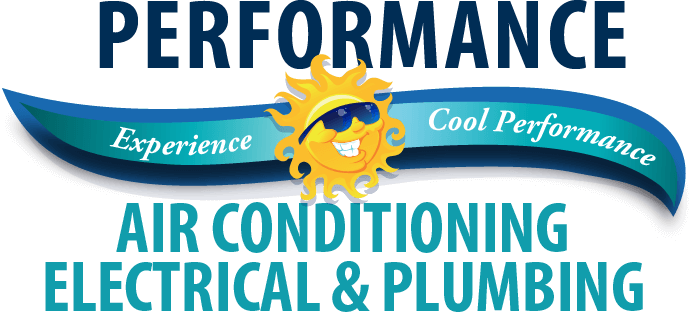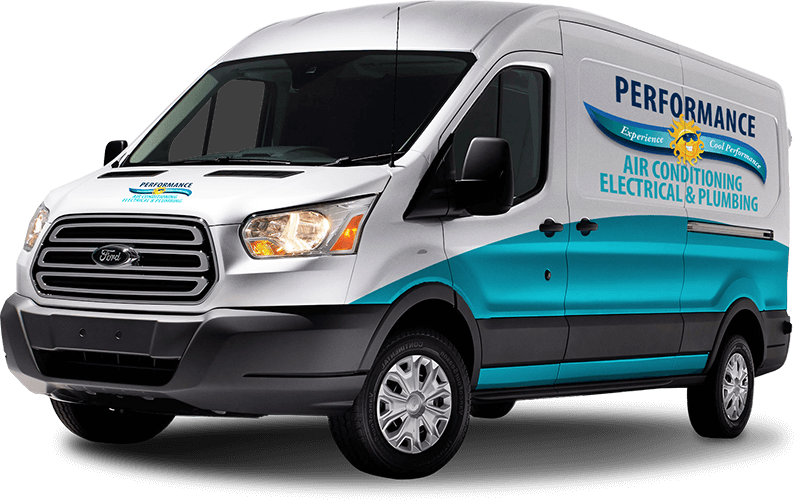
Everyone recognizes that an air conditioner provides comfort on a hot summer day. However, providing a home with cool air isn’t the only purpose of an air conditioner. Improving air quality is one of the hidden benefits of air conditioners. So, how does this hidden benefit come into play? Why does indoor air quality matter? What are the steps for how to improve indoor air quality regarding your AC unit? Keep reading to find out the answers you need.
How Indoor Air Pollution Occurs
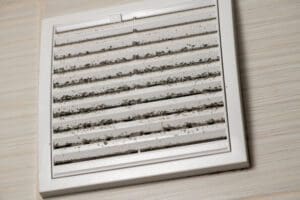
Most people think of air pollution as something that happens outside. They think of factories billowing smoke and car exhaust permeating the air. However, there are plenty of alternative sources of indoor air pollution.
In fact, indoor air pollution can be even worse than outdoor air pollution. This is because many locations indoors lack the ventilation necessary to remove pollutants. The EPA estimates that this can lead to indoor air being up to five times more polluted than outdoor air.
In many cases, the pollution comes from the house itself. Insulation with asbestos, newly installed floors and carpets, and some wooden materials all leak pollutants into the air. Meanwhile, cleaning products and appliances that burn fuel, like stovetops or ovens, add to this pollution. Even outdoor air pollution can make its way inside and reduce the air quality in your home.
All these factors have a negative impact on your health. Studies have shown poor indoor air quality can exacerbate allergies and other pre-existing respiratory issues, like asthma. It can even cause these issues to develop for the first time.
How Air Conditioning Can Help Improve the Indoor Air Quality
With all of these issues reducing air quality in a home, it can be hard to see where the solution lies. However, since the problem is often the result of poor ventilation, the HVAC system is a great place to start.
An HVAC system actively pushes the air through a building. At points in that process, it can work to improve the quality of the air. This primarily occurs through filters. Air passing into an HVAC system is filtered through filters to remove pollutants. The freshly cleaned air is then pumped into the home. Meanwhile, the old air that was in the room is pumped out. This continuous cycle ensures that the air quality improves over time.
Different types of filters accomplish this goal in ways that are more or less effective than others. Higher-efficiency filters are made from a finer mesh material that traps more particles as they try to make their way through. However, this also makes it harder for air to pass through in general. Choosing the right filter quality is a matter of weighing the effectiveness of the filter against the cost of using it.
HVAC systems also improve air quality by constantly circulating air. When a room with a pollution source is left on its own, the air quality gradually worsens. The air quality in that room will not improve on its own. Simply providing a source of ventilation makes a significant impact.
In addition, effective humidity control can improve air quality. Most rooms are at their best when the humidity is between 35% and 50%. When the humidity rises above this level, mold and mildew start to grow, which add pollutants to the air. Dehumidifiers help regulate the humidity level in a room, which improves air quality.
Some HVAC systems even incorporate other air treatment systems. Some use UV and plasma treatments to eliminate pathogens from the air. These are materials that would otherwise not be caught by the filters. This is an effective choice for buildings that must keep germs and viruses at bay, like medical facilities.
Maintaining Air Conditioning Systems for Optimal Indoor Air Quality
Because of the impact air conditioning systems have on indoor air quality, maintaining quality air starts with maintaining the air conditioning system itself. If the system works in isolation, it will degrade over time. This will increase the likelihood of the system to push around problematic particles and not filter the air properly.
Steps can also be taken to improve how an HVAC system handles air quality. The steps outlined below allow the system to work more efficiently.
-
Routine Air Conditioning Maintenance
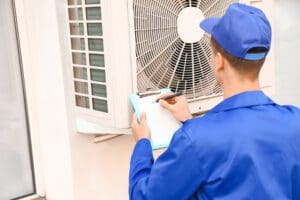
An HVAC system can’t maintain high air quality without receiving routine maintenance. It may not even run at all. Regular AC maintenance is essential to keeping an air conditioning system running. If a system goes without maintenance, problems can appear and worsen over time. This can ruin the system altogether.
Maintenance is also practical. It keeps the system running efficiently and prevents it from using excessive energy. This saves money on energy costs. Keeping to a schedule makes regular AC maintenance something that can’t be missed. Most HVAC companies allow you to schedule an appointment online to get the process started.
-
Regular Cleaning
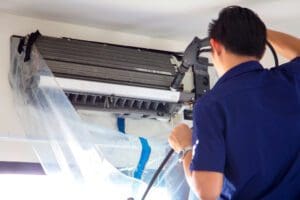
Dust, debris, and allergens all have the potential to build up in the vents and ducts of HVAC units. This can make the HVAC system responsible for pushing these contaminants around the home. The best way to undo this damage is through regular cleaning. Properly cleaning the system removes contaminants and prevents them from recirculating.
The upside is that most professional HVAC maintenance companies offer HVAC system cleaning services alongside maintenance services. You can knock out two birds with one stone when it comes to keeping your air conditioner in proper working order for years to come.
-
Changing Filters
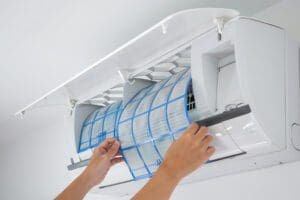
Your air conditioner filter is responsible for taking pollutants out of the air before they enter the HVAC system. However, they can’t do this indefinitely. Eventually, the filter collects so many pollutants that it’s no longer effective in improving indoor air quality.
When this happens, changing the air conditioner filter is necessary. Most of the time, this means simply swapping out the filter currently in the unit with a new one. Most filters contain information along the side that will tell what size and type is needed for a replacement. If they don’t, the same information can be found in the HVAC unit’s manual.
If filters aren’t regularly changed, they can create problems for the entire HVAC system. The dirt and debris in the filter will restrict airflow going through the system. This will prevent the system from working as efficiently and cost-effectively.
-
Check for Mold and Mildew
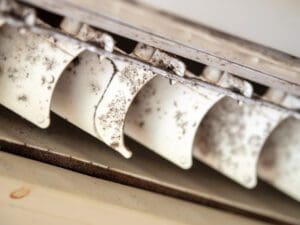
One byproduct of air conditioning is water. The cooling system naturally produces condensation, and the dehumidifying effect gathers water. This moisture can create an environment where mold and mildew can thrive.
As a result, it’s incredibly important to watch out for mold and mildew growth in an HVAC system. Any potential mold and mildew issues should be addressed when the system is cleaned. In addition, the system’s condensate drains should be monitored for any problems.
Mold and mildew can also appear in other locations around the house. If these areas are near the HVAC system, the system will spread mold and mildew spores throughout the house. This means you must monitor and clean any area of the house where these substances are likely to grow, like dark attics and basements.
-
Use Smart Technologies
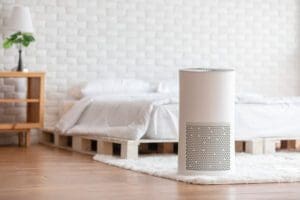
Most air conditioning systems help improve the quality of the air on their own. However, additional features can enhance the system’s ability to improve indoor air quality.
Some smart technologies include UVC lights and oxidation and ionization air purifiers. These technologies actively clean the air and help eliminate problematic substances. Most air conditioning systems don’t include them, but they can be added to many systems. The best way to determine if this is possible is to consult a professional HVAC service.
Technologies even allow you to test the quality of air. Air quality testing lets you know how healthy the air in your home is. Knowing this information can tell you whether or not you have an indoor air quality problem.
Contact Performance AC
To get the most out of your air conditioner and find out how to improve indoor air quality in your home, you need to contact a professional for help. At Performance AC, we can provide the professional services you need.
Backed by more than 20 years of industry experience, we’ll ensure your air conditioner operates at peak performance, is free of allergens, and improves your indoor air quality. With our help, the indoor air quality in your home will be better than ever. Schedule an appointment online to give your indoor air quality the upgrade it deserves.
